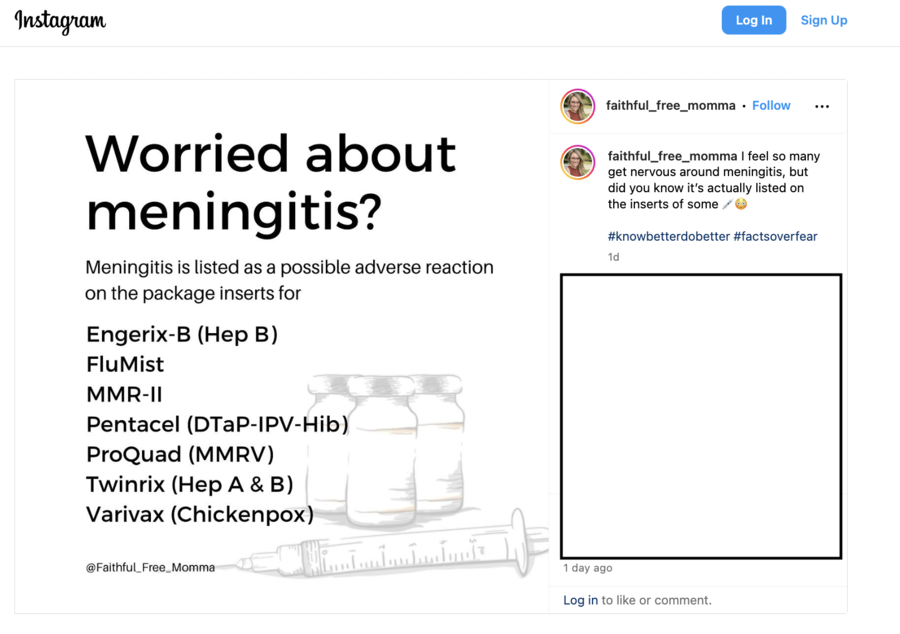Fact Check: Meningitis Is NOT Confirmed Common Side Effect Of 7 Vaccines Administered In US

Is meningitis proven to occur frequently after the administration of seven U.S. vaccines? No, that’s not true: According to the Institute of Vaccine Safety at Johns Hopkins School of Public Health, most vaccines from the list on an Instagram post are not known to be linked to meningitis. Varicella and measles vaccines “very rarely” cause this condition. An image shared on social media distorted available safety data.
The claim appeared in a post (archived here) published on Instagram on January 15, 2024. It opened:
I feel so many get nervous around meningitis, but did you know it’s actually listed on the inserts of some 💉😳
#knowbetterdobetter #factsoverfear
The text in the shared poster continued:
Worried about
meningitis?
Meningitis is listed as a possible adverse reaction
on the package inserts for
Engerix-B (Hep B)
FluMist
MMR-II
Pentacel (DTaP-IPV-Hib)
ProQuad (MMRV)
Twinrix (Hep A & B)
Varivax (Chickenpox)
@Faithful_Free_Momma
This is what it looked like on Instagram at the time of writing:
(Source: Instagram screenshot taken on Wed Jan 17 15:36:01 2024 UTC)
Meningitis is a potentially deadly inflammation or swelling “of the protective membranes covering the brain and spinal cord,” as defined by the Centers for Disease Control and Prevention (CDC) (archived here). It can be caused by several factors, but the most widespread causes are viruses and bacteria.
The post on Instagram implied that meningitis is a common — and confirmed — side effect of all listed vaccines, but it omitted important context.
A representative of the Institute of Vaccine Safety at Johns Hopkins School of Public Health told Lead Stories via email on January 17, 2024:
Package inserts include a long list of outcomes, many (if not most) of which have not been shown to be caused by the vaccine.
In the United States, adverse events from vaccines can be reported – without documentation or verification – to Vaccine Adverse Event Reporting System (archived here) by virtually anyone with a web-enabled computer — drug manufacturers, health care providers, patients or their family. Until investigated, those entries do not automatically mean that a causal link between a vaccine and an unwanted event has been established, the Food and Drug Administration website (FDA) (archived here) says:
Adverse events reported to VAERS are not necessarily side effects caused by vaccination. An adverse event is a health problem that happens after vaccination that may or may not be caused by a vaccine. These events may require further investigation.
A disclaimer (archived here) that appears on the VAERS database search page repeats:
VAERS reports alone cannot be used to determine if a vaccine caused or contributed to an adverse event or illness.
The number of cases where the causal link between vaccines and meningitis was proven is significantly lower than the number of reports on VAERS, and that doesn’t cover the entire list from Instagram.
The website of the Institute of Vaccine Safety at Johns Hopkins School of Public Health (archived here) reads:
Varicella vaccine in routine use in the United States can very rarely cause viral meningitis. Measles-containing vaccines can very rarely cause measles inclusion body encephalitis (MIBE). Mumps vaccines used in other countries have caused meningitis and encephalitis. However, the mumps vaccine in routine use in the United States is made from a different strain of vaccine virus and has not been shown to cause meningitis or encephalitis. The benefit of vaccination in preventing neurologic diseases such as meningitis and encephalitis greatly outweighs the minimal risk of vaccine complications.
Lead Stories searched VAERS and found 65 entries discussing MMR II and meningitis. That was the highest number among all the vaccines from the post in question.
The CDC website (archived here) says there is a single confirmed case of meningitis caused by a measles component of MMR vaccines:
Measles inclusion body encephalitis, or severe brain swelling caused by the measles virus, is a complication of getting infected with the wild-type measles virus. While rare, this disorder almost always happens in patients with weakened immune systems. The illness usually develops within 1 year after initial measles infection and has a high death rate. There have been three published reports of this complication happening to people who are vaccinated. In these cases, encephalitis developed between 4 and 9 months after MMR vaccination. In one case, the measles vaccine strain was identified as the cause.
The measles vaccination program was implemented in the United States in 1963. Before that, as the CDC (archived here) points out, between 3 million and 4 million people had been infected with it annually, resulting in at least 48,000 hospitalizations and between 400 and 500 deaths each year. In 2021, the agency wrote:
Since then, widespread use of measles virus-containing vaccine has led to a greater than 99% reduction in measles cases compared with the pre-vaccine era.
As for varicella, the CDC website lists three confirmed cases: One patient was a healthy adolescent, and two others were children who, respectively, developed meningitis and encephalitis. To put that into perspective, roughly 212 million doses (archived here) of this vaccine were distributed in the U.S. and abroad between March 1995 and March 2017.
A representative of the Institute of Vaccine Safety told Lead Stories via email on January 17, 2024:
Other vaccines have not been shown to cause meningitis.
Lead Stories contacted the FDA for additional comments. If we get a response, this fact check will be updated as appropriate.
Other Lead Stories fact checks about vaccines can be found here.
This article has been archived for your research. The original version from Lead Stories can be found here.



